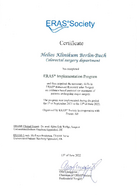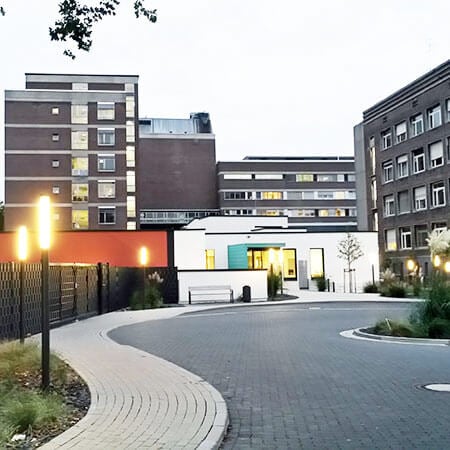Endoscopic Resection for Rectal Cancer treatment in Germany
Treatment prices are regulated by national law of the corresponding countries, but can also include additional hospital coefficients. In order to receive the individual cost calculation, please send us the request and medical records.

Department of General, Abdominal Surgery and Surgical Oncology
The Department of General, Abdominal Surgery and Surgical Oncology offers the full range of services in these medical fields. Whenever possible, operations are performed using minimally invasive techniques, which are the gold standard of modern surgery. The outstanding quality of medical care is confirmed by numerous prestigious certificates, including certificates from the German Cancer Society, the German Hernia Society, etc. In addition, the department provides innovative hyperthermic intraperitoneal chemotherapy (HIPEC), which is available only in the most progressive clinics in Europe.







Department of General and Abdominal Surgery, Colorectal Surgery, Hepatopancreatobiliary Surgery, Hernia Surgery and Bariatric Surgery
The Department of General and Abdominal Surgery, Colorectal Surgery, Hepatopancreatobiliary Surgery, Hernia Surgery and Bariatric Surgery provides the full range of surgical treatment in its field of competence. The department's highly qualified surgeons annually perform about 2,000 surgical interventions. Extensive clinical experience allows the specialists to perform even particularly complex operations. The department’s advanced operating rooms serve for surgery to treat gastrointestinal diseases, liver, gallbladder, bile duct, pancreatic, rectal, anal and colon pathologies. The medical facility also successfully performs operations to treat hernias: inguinal, umbilical, and anterior abdominal wall hernias. In addition, the department's doctors deal with the surgical treatment of morbid obesity. Minor traumatic laparoscopic interventions are considered the gold standard, which guarantee a patient minimal risks and rapid postoperative restoration. Surgeons tell the patient in detail about their upcoming treatment and, in every possible way, support them in their recovery.







Department of General and Abdominal Surgery, Colorectal Surgery, Endocrine Surgery and Hernia Surgery
The Department of General and Abdominal Surgery, Colorectal Surgery, Endocrine Surgery and Hernia Surgery offers the full range of modern surgical interventions in the areas of its specialization. Every year, the medical facility performs more than 2,500 surgical interventions on an inpatient and outpatient basis. The department has vast clinical experience in the field of minimally invasive surgery, which allows the patient to avoid severe pain and prolonged hospitalization. In addition, the department offers robotic surgery using the most modern models of the da Vinci surgical system. The medical facility has the status of the Reference Center for Minimally Invasive Surgery and Hernia Surgery. Surgical treatment of cancer is one of the department's clinical priority focuses. A large number of da Vinci robot-assisted interventions are performed here for gastrointestinal cancers. The department holds a leading position in the use of the da Vinci surgical system in the treatment of rectal and sigmoid cancer patients. The operating rooms of the medical facility are equipped with the very latest technology, while hygiene and safety standards are at the highest level as well. Prior to surgery, the patient undergoes a comprehensive examination. Doctors also assess the risks of the upcoming operation and its expected results. With appropriate clinical indications, preference is always given to minimally invasive surgery.






Colorectal cancer is the medical definition of a malignant tumor of the mucous membrane of the colon or rectum. Colorectal cancer is a dangerous disease that requires complex treatment.
The causes of colorectal cancer
Before choosing the methods of rectal cancer treatment, it is important to get to know the possible causes of colorectal cancer development.
The development of colorectal cancer may be caused by certain factors, including:
- Consumption of foods that include a high level of fat. The quality of food is important as well. The excessive consumption of animal protein along with low fiber intake contributes to the digestion pathologies, constipation, and the formation of polyps, which can further lead to the development of rectal cancer.
- Ignored symptom of systematic constipation, leading to the formation of a large number of carcinogenic substances in the large intestine.
- Genetic predisposition. The hereditary factor plays an important role. People with a family history of colorectal cancer should undergo preventive examinations regularly.
- Inflammatory diseases affecting the tissues of the large intestine.
According to research, acute and chronic inflammatory processes contribute to rapid aging and disruption of regeneration of the intestinal epithelial layer.
Symptoms of colorectal cancer
The causes of colorectal cancer are still not established.
Colorectal cancer is known to develop from altered cells in the gastrointestinal tract. Normally, healthy cells grow and divide in an orderly manner, but sometimes changes may appear in the process. Cells continue the process of dividing even if they become atypical. In the colon and rectum, this uncontrolled cell growth can lead to polyps formation. Subsequently, over time some of the polyps can transform into malignant neoplasms.
Colorectal cancer most often develops from polyps. In some cases, precancerous growths are located inside the intestinal wall and do not have polyp features. These types of neoplasms are more difficult to detect but are less common. Removing polyps and other types of neoplasms before they become cancerous can prevent colorectal cancer.
Rectal polyps vary in size. Small ones may not cause any symptoms. Patients with rectal polyps may not know they have them until polyps are detected during colonoscopy.
However, sometimes polyps can cause symptoms that include:
- Rectal bleeding. While it can be a sign of both polyps or progressing colorectal cancer, patients with rectal bleeding can also be diagnosed with hemorrhoids or fissures in the anus. Anyway, if the blood appears, it is necessary to visit a doctor.
- Blood in the stool. Blood may appear in the stool or can even stain the stool black. You should be aware that discoloration of stool is not always an indicator of a problem – iron supplements and antidiarrheal medicines can make stool black, while beets and licorice root can cause natural stool redness.
- Constipation or diarrhea. While changes in bowel function that last longer than a week may indicate the presence of a large rectal polyp, it could also be the result of some other conditions.
- Stomachache. Sometimes large colorectal polyps can partially obstruct the intestinal lumen, making it difficult for stool to move, leading to cramping abdominal pain, nausea, vomiting, and severe constipation.
You must see your doctor if you notice any discomfort, including:
- Abdominal pain
- Blood in stool
- Changes in bowel function that last longer than a week
You should undergo preventative procedures for polyp detection if you have risk factors, including a family history of colorectal cancer.
Diagnostics
The danger of colorectal polyps is in their ability to become cancerous. Therefore, it is so important to diagnose them at an early stage and, if necessary, to remove them. This is especially fraught with dangerous consequences for patients with rectal cancer hereditary predisposition.
One of the main procedures for rectal cancer diagnosis is a colonoscopy. Colonoscopy is done to examine the lining of the large intestine.
If the doctors find anything suspicious in the colon lining during colonoscopy, they will take a piece of tissue for histological examination. If they find a polyp or polyps, they can remove them immediately.
A virtual colonoscopy procedure (computed tomography of the large intestine) can be also prescribed. If patients with rectal cancer suspicion are unable to undergo a colonoscopy, doctors may recommend a virtual colonoscopy as a preliminary diagnostic method. Computed tomography of the large intestine is widely used among other screening preventive examination procedures.
The endoscopic mucosal resection procedure can also be conducted with the purpose of diagnosis making. Endoscopic mucosal resection is more complex and time-consuming than other examination procedures. Therefore, for rectal cancer treatment in Germany, this minimally invasive procedure is carried out only in a small number of specialized gastroenterology and endoscopy departments.
During endoscopic mucosal resection procedure The suspicious areas can be determined. The endoscopic mucosal resection procedure is not limited to examining and taking a piece of tissue for biopsy – it also involves the tumor removal. This minimally invasive surgery for rectal cancer treatment is an alternative to conventional posterior trans sphincteric surgery.
Endoscopic resection for rectal cancer treatment
The importance of endoscopic resection is determined by the fact that it prevents the development of advanced colorectal cancer. Many colon tumors are benign before they become cancerous.
Endoscopic resection is a minimally invasive surgical procedure for rectal cancer treatment. The surgery is suitable for almost any organs and tissues, including intestines.
Endoscopic resection is widely used for rectal cancer treatment in Germany. However, some polyps are technically more difficult to remove due to their size, location, or type, which may be associated with an increased risk of complications. In these cases, modern rectal cancer treatment in Germany can offer endoscopic mucosal resection or endoscopic submucosal dissection.
Endoscopic mucosal resection is a high-tech minimally invasive organ-preserving procedure for patients with rectal cancer. Endoscopic mucosal resection is performed on an outpatient basis.
In endoscopic mucosal resection, polyps are separated from the underlying tissue by the prior injection of the fluid. In the case of endoscopic mucosal resection, the polyp is removed in parts. In endoscopic submucosal dissection, fluid is injected deep into the affected area and the whole polyp is removed at once. With endoscopic mucosal resection, a fragment of the mucous membrane and muscle layer is removed. In some techniques, part of the submucosal layer of the large intestine is removed along with the tumor.
Endoscopic mucosal resection was originally developed for the minimally invasive treatment of early stage gastric cancer. This minimally invasive procedure allowed neoplasms to be removed fully.
Along with the use of endoscopic mucosal resection for the removal of stomach tumors at an early stage, in hospitals in Germany surgeons began to use this technology as the type of minimally invasive treatment of patients with rectal cancer.
Since 2008, an official register of endoscopic mucous resection procedures for rectal cancer treatment in Germany exists, which collects information on the experience of German surgeons. Based on the data collected in the registry, it is easier for surgeons to determine which patients with rectal cancer will benefit from such minimally invasive surgical techniques.
Subsequently, the techniques of endoscopic mucosal resection in hospitals in Germany began to be prescribed by surgeons for patients with rectal cancer. The main aim was the removal of polyps and pre-malignant adenomas in the colon and rectum.
There are several goals of endoscopic resection, including:
- Removal of a malignant tumor at an early stage of development
- Providing palliative care in cases of advanced stages of colorectal cancer
Endoscopic mucosal resection of the large intestine at an early stage is performed based on the results of a histological examination of a polyp. If the diagnosis is determined during the diagnostic procedures, the decision to conduct endoscopic mucosal resection of the pathological area is made based on its size, shape, and depth of infiltration. Patients with a rectal tumor, the depth of infiltration of which does not exceed 1000 microns, are subject to endoscopic resection techniques.
Unfortunately, it is not always possible to remove polyps using endoscopic resection or any other minimally invasive techniques. If the size of the neoplasm exceeds two centimeters, the patient may undergo a conventional surgical intervention. In most cases, conventional surgery is associated with many risks for patients with rectal cancer, including the risk of bleeding and recurrence. That is the reason for the timely visiting specialist and undergoing preventive examinations, the aim of which is to identify polyps at the early stages of formation.
Benefits of endoscopic resection
The technique. The procedure is performed by introducing endoscopic equipment into the patient's rectum. During this minimally invasive procedure, the risk of damaging the tissues is almost eliminated.
No anesthesia. Anesthesia is not required during endoscopic resection. Exceptions are cases when the need to administer the drug is connected with the presence of other abnormalities in patients with rectal cancer.
No anastomosis (stitching the ends of the rectum). The need for anastomosis during endoscopic resection is completely excluded. After completing the procedure, the patient does not need to follow the strict rules of the postoperative period. The digestive function is preserved in full, which allows the patient to return to normal life within one to two weeks after the endoscopic resection.
Low risk of recurrence. In some cases, after endoscopic resection, there is a certain risk of recurrence of pathological formations. In general, this does not pose a danger to the patient, since repeated endoscopic resection does not reduce bowel function. It should be noted that the risk of recurrence with endoscopic resection is minimal.
The price for treatment in Germany
The price for the treatment of rectal cancer in hospitals listed on the Booking Health website is relatively low.
With Booking Health, you can undergo rectal cancer treatment in Germany of high quality at a lower cost. The cost varies, as the price for treatment depends on the hospital, the diagnosis, and the complexity of treatment.
The price for treatment with endoscopic resection in Germany is in the range of 24,233 EUR – 37,612 EUR.
Where can I undergo rectal cancer treatment in Germany?
- Academic Hospital Brothers of Charity Munich
- University Hospital of Ludwig Maximilian University Munich
- Charite Hospital Berlin
- University Hospital Ulm
- University Hospital Marburg UKGM
You can check out the full list of hospitals in Germany on the Booking Health website.
How can I undergo rectal cancer treatment in Germany?
It is not easy to choose the right hospital that will perform a quality endoscopic resection procedure at an adequate cost. It is necessary to have experience and accurate information on the success rates of the hospital in rectal cancer treatment.
We may help you during this difficult period and take on all the issues. Booking Health will help you select a hospital, considering your wishes.
We have up-to-date information on the success rates of hospitals in Germany. You can be free of unnecessary troubles, while Booking Health takes care of all organizational issues. Our goal is to find the best medical facility for rectal cancer treatment in Germany with a suitable price for treatment for you.
Cancer can be treated! The earlier you start the rectal cancer treatment, the higher the chances of returning to your usual life.
We will provide you with all the necessary information, including the detailed description of the hospital of your liking and the price for treatment.
Leave a request on the Booking Health website and our manager will contact you shortly.

